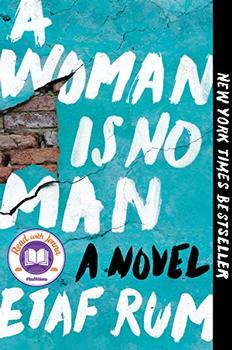Summary | Excerpt | Reading Guide | Reviews | Beyond the Book | Readalikes | Genres & Themes | Author Bio

A Novel
by Etaf Rum
"Really?"
"Yeah."
"So is that what you do in America? You're a priest?"
"Oh, no."
"Then what do you do?"
"I own a deli."
"But why aren't you an imam?" Isra asked, emboldened by their first conversation.
"I couldn't do that in America."
"What do you mean?"
"My father needed me to help him run the family business. I had to give that up."
"Oh." Isra paused. "I didn't expect that."
"Why not?"
"I just always thought ..." She stopped, thinking better of it.
"What?"
"I just assumed you'd be free." He gave her a curious expression. "You know, because you're a man."
Adam said nothing, continuing to stare. Finally he said, "I am free," and looked away.
Isra studied Adam for a long time as they finished their sandwiches. She couldn't help but think of the way his face had stiffened at the mention of his childhood dream. His tight smile. She pictured him in the mosque during Ramadan, leading the maghrib prayer, reciting the Qur'an in a strong, musical voice. It softened her to picture him working behind a cash register, counting money, and stocking shelves when he wanted to be leading prayer in a mosque. And Isra thought for the first time, sitting there beside him, that perhaps it would not be so hard to love him after all.
Isra spent her last night in Birzeit propped in a gold metal chair, lips painted the color of mulberries, skin draped in layers of white mesh, hair wound up and sprayed with glitter. Around her, the walls spun. She watched them grow bigger and bigger until she was almost invisible, then get smaller and smaller as if they were crushing her. Women in an assortment of colors danced around her. Children huddled in corners eating baklava and drinking Pepsi. Loud music struck the air like fireworks. Everyone was cheering, clapping to the beat of her quivering heart. She nodded and smiled to their congratulations, yet inside she wasn't sure how long she could stave off tears. She wondered if the guests understood what was happening, if they realized she was only a few hours away from boarding a plane with a man she barely knew and landing in a country whose culture was not her own.
Adam sat beside her, his black suit crisp against his white button-down shirt. He was the only man in the wedding hall. The others had a room of their own, away from the sight of the dancing women. Even Adam's younger brothers, Omar and Ali, whom Isra had only met minutes before the wedding, were forbidden. She couldn't tell how old they were, but they must've been in their twenties. Every now and then, one would poke his head in to watch the women on the dance floor, and a woman would remind him to stay in the men's section. Isra scanned the room for her own brothers. They were all too young to sit in the men's section, and she spotted them running around the far corner of the hall. She wondered if she would ever see them again.
If happiness were measured in sound, Adam's mother was the happiest person in the room. Fareeda was a large, broad woman, and Isra felt the dance floor shrink in her presence. She wore a red-and-black thobe, with oriental patterns embroidered on the sleeves, and a wide belt of gold coins around her thick waist. Black kohl was smeared around her small eyes. She sang along to every song in a confident voice, twirling a long white stick in the air. Every minute or so, she brought her hand to her mouth and let out a zughreta, a loud, piercing sound. Her only daughter, Sarah, who looked about eleven or so, threw rose petals at the stage. She was a younger, slimmer version of her mother: dark almond eyes, black curls flowing wildly, skin as golden as wheat. Isra could almost see a grown version of Sarah sitting as she sat now, her tiny frame buried beneath a white bridal dress. She winced at the thought.
She looked around for her mother. Mama sat in the corner of the wedding hall, fidgeting with her fingers. So far she had not left her seat throughout the entire wedding, and Isra wondered if she wanted to dance. Perhaps she was too sad to dance, Isra thought. Or perhaps she was afraid to send the wrong message. Growing up, Isra had often heard women criticize the mother of the bride for celebrating too boisterously at the wedding, too excited to be rid of her daughter. She wondered if Mama was secretly excited to be rid of her.
Excerpted from A Woman Is No Man by Etaf Rum. Copyright © 2019 by Etaf Rum. Excerpted by permission of Harper. All rights reserved. No part of this excerpt may be reproduced or reprinted without permission in writing from the publisher.
Your guide toexceptional books
BookBrowse seeks out and recommends the best in contemporary fiction and nonfiction—books that not only engage and entertain but also deepen our understanding of ourselves and the world around us.